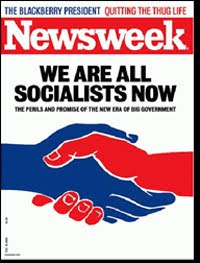
Matt Thompson writes that the media misses three of the four aspects of any big, long-running story.
I particularly agree with number 1 (missing: how we got here and what we know) and number 2 (missing: how journalists know what they know) which makes a recent journalistic trend so troubling. Newsgathering operations, in their ongoing and seemingly never-ending cost-cutting, have shifted away from actually gathering news, which is expensive, to opining on the issues of the day, which is cheap. Most have not been so blatant as Newsweek in this shift, but make no mistake: it's happened.
The reason cited for that shift (cost rarely is) is always some form of the need to compete with the Internet, which newspaper people speak of as some amorphus blob that occasionally becomes sentient. But the ready availability of opinion on the Internet is exactly why the mainstream media should go the other way. In olden days, the media reported about things only it really had access to. Companies and candidates weren't sending press releases to everyday folks, and commission and council meetings were ill-attended except for the most ardently involved.
Both of those examples is no longer the case, thanks to that amorphus sentient blob. Average everyday people (read: former newspaper readers) can now opt in for free to information from almost any entity. Just as importantly, the choice is theirs.
The technology makes organizing people substially more efficient, as Clay Shirky outlines in "Here Comes Everybody." The combination of more interested audiences (they opted in, remember) with easier organizing capabilities have caused an explosion of passionate advocacy. Choose an issue and you can become quickly awash with essays, blog posts, video and podcasts of every aspect from every angle.
Newspapers can't compete with that. What newspapers can provide is a disintested arbiter, substantiating facts and differentiating them from areas where legitimate disagreement remains.
Instead we get things like the above Newsweek cover (h/t Pajamas Media). And they wonder why we complain about bias in the media.